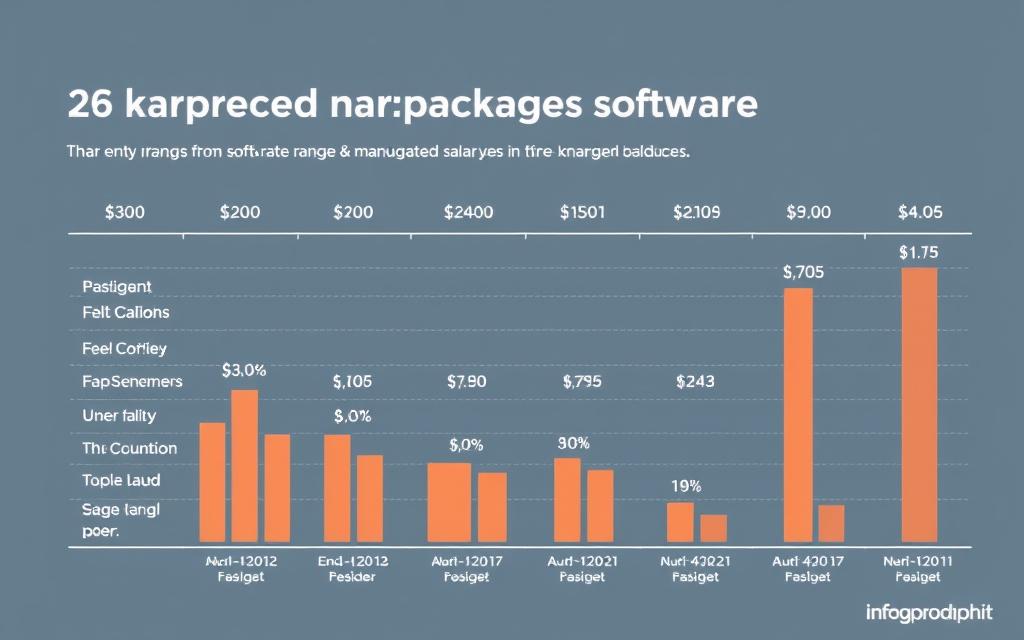Table of Contents
The U.S. leads the global tech sector, with giants like Apple, Microsoft, and Google driving innovation. The prepackaged software industry alone generates $360.6 billion in wholesale value, showcasing its massive scale.
Over 557,000 firms operate in this space, creating diverse roles beyond coding. With 26% projected growth through 2031, careers in this field offer stability and advancement potential.
This guide explores high-demand positions, required skills, and emerging trends shaping the sector. Whether you’re starting your career or transitioning, understanding this dynamic market is key to success.
The computer software field continues expanding, with 370,600 new positions expected soon. Specialized training can unlock these rewarding opportunities in a thriving digital economy.
What Is Prepackaged Software?
Mass-produced applications power everything from spreadsheets to cybersecurity. Prepackaged software refers to ready-to-use programs sold commercially, like *Microsoft Office* or *Adobe Photoshop*. These solutions install automatically, making them ideal for non-technical users.
Unlike custom-built tools, prepackaged options balance functionality with ease of use. Enterprises often customize modules (e.g., SAP) without needing full-scale software development. This “plug-and-play” approach reduces costs and deployment time.
Common examples include:
- Operating systems (*Windows*, *macOS*)
- Productivity suites (*Google Workspace*)
- Cybersecurity tools (*Norton Antivirus*)
| Feature | Prepackaged Software | Custom Software |
|---|---|---|
| Development Time | Weeks (ready-to-deploy) | Months–years |
| Cost | Lower upfront investment | High development fees |
| Flexibility | Limited customization | Tailored to exact needs |
The computer software industry relies on standardized products for scalability. Roles in this sector focus on mass-market production, testing, and user support—key drivers of technology employment growth.
The U.S. Prepackaged Software Industry at a Glance
America’s digital economy thrives on standardized software solutions. The software industry contributes $1.9 trillion to U.S. GDP, powering businesses and government operations alike. Over 1.4 million developers drive innovation, ensuring global competitiveness.

Regional hubs like Silicon Valley, Austin, and Boston anchor this growth. These tech epicenters attract top talent, with 30% of the global IT market controlled by U.S. firms. Fortune 500 companies rely heavily on solutions like Oracle databases for efficiency.
Cloud-based tools grow at 5% annually, reshaping computer software delivery. Remote work accelerates demand for scalable platforms, blending national talent pools with global opportunities. This shift underscores the sector’s adaptability.
- Economic impact: 557,000 firms generate one-third of global IT revenue
- Employment: Developer roles outpace national job growth by 3x
- Innovation: AI integration expands prepackaged tool capabilities
The computer software sector remains a cornerstone of U.S. tech leadership. With data-driven solutions dominating enterprises, careers here promise long-term stability and advancement.
How Many Jobs Are Available in Computer Software Prepackaged Software?
Tech employment trends reveal shifting priorities in development roles. The U.S. will add 370,600 new positions for software developers by 2031—a 26% surge. Meanwhile, traditional programmer roles decline by 10%, reflecting automation’s impact.
Annual job openings reach 162,900 due to retirements and sector expansion. High-growth areas like cybersecurity and cloud engineering offset losses in legacy coding jobs. Specialized skills now drive hiring.
Key growth areas include:
- Quality Assurance: 21% increase in testing roles
- Web Development: 30% faster growth than hardware engineering
- Systems Architecture: 15% demand spike for cloud infrastructure
| Role | 2021 Employment | 2031 Projection | Change |
|---|---|---|---|
| Software Developers | 1,425,900 | 1,796,500 | +26% |
| Programmers | 174,400 | 156,600 | -10% |
| Cybersecurity Specialists | 163,800 | 218,200 | +33% |
Salaries in high-demand fields often exceed $120,000 annually. Employers prioritize certifications in AI integration and DevOps alongside traditional degrees. This evolution creates pathways for career changers.
The software developers boom underscores the sector’s resilience. With 6-figure salaries and remote options, these roles dominate the future of technology workforces.
Top 12 High-Paying Jobs in Prepackaged Software
Innovation drives demand for specialized roles in tech. Professionals with expertise in AI, cloud systems, and cybersecurity command premium salaries. Below are the most lucrative positions shaping the digital landscape.

1. Software Developer
Average salary: $123,210. These professionals design applications using Python and R. They integrate machine learning models into commercial products.
2. Programmer
Focuses on writing code for specific functions. Strong logic skills outperform formal education requirements in many cases.
3. Application Developer
Creates mobile and desktop solutions. Specializations in iOS or Android development often yield higher compensation.
4. Software Engineer
Requires a degree computer science or related field. Engineers architect complex systems for scalability and security.
5. Web Developer
Front-end specialists earn up to $98,000 annually. Mastery of JavaScript frameworks like React increases marketability.
6. Hardware Engineer
Designs physical components for tech devices. This niche field offers stability with 7% projected growth.
7. Database Administrator
Manages critical information storage systems. Certifications in SQL or Oracle boost earning potential by 22%.
8. Computer Network Architect
Builds communication infrastructures for enterprises. Cloud migration expertise commands $120,000+ salaries.
9. Cloud Engineer
Implements AWS and Azure solutions. Remote work options are common in this rapidly expanding field.
10. Systems Architect
Designs enterprise-level technical frameworks. Senior roles often require 10+ years of experience.
11. Cybersecurity Specialist
Protects organizations from digital threats. Demand outpaces supply, with 33% more positions needed by 2031.
12. Data Scientist
Analyzes complex data sets using TensorFlow and Tableau. AI integration skills can push salaries beyond $150,000.
Salary Insights for Prepackaged Software Careers
Compensation in the software industry reflects specialization and regional demand. Entry-level web developers earn $60,000-$80,000 annually, while cloud engineers start at $85,000+. Senior roles like CTOs command $314,084 on average.

Geographic location significantly impacts earnings. Bay Area professionals receive 25% higher pay than the national average salary. Tech hubs like Seattle and Boston also offer premium compensation.
Beyond base pay, many firms provide:
- Stock options (FAANG companies average $50,000+ annually)
- Performance bonuses (15-20% of salary)
- Remote work stipends ($2,000-$5,000 yearly)
| Position | Experience Level | Salary Range |
|---|---|---|
| Systems Architect | Mid-career | $120,000-$160,000 |
| QA Engineer | Entry-level | $71,297 |
| Technical Support | Senior | $80,000-$120,000 |
| Sales Engineer | Mid-career | $96,072 |
Freelancers with niche skills like AI integration charge $80-$150/hour. Certifications in computer science specialties can increase rates by 40%. The market particularly values cloud security expertise.
For detailed salary benchmarks across roles, explore our comprehensive compensation guide.
Skills and Qualifications Needed
Technical expertise opens doors in the evolving digital landscape. Over 78% of roles demand at least a degree computer science or related field. Specialized certifications often supplement formal education.

Industry-recognized credentials accelerate professional growth. Top certifications include:
- AWS Solutions Architect (cloud systems)
- CISSP (cybersecurity)
- PMP (project management)
Coding bootcamps provide focused programming languages training in 3-6 months. Traditional degrees offer broader theory and networking opportunities. Many employers value both pathways when combined with practical experience.
Beyond technical skills, teamwork and communication prove equally vital. Agile methodologies dominate development cycles, requiring collaborative mindsets. Client-facing roles particularly benefit from clear explanation abilities.
Emerging technologies create new competency demands. Blockchain development and Rust programming show 140% year-over-year job post growth. Staying abreast of such trends ensures long-term career resilience.
Mid-career professionals often pursue specialized training. A degree computer science paired with niche certifications maximizes earning potential. Hands-on experience remains the ultimate differentiator in this competitive field.
Future Trends in Prepackaged Software Employment
The digital landscape evolves rapidly, creating new opportunities in technology careers. AI-driven development tools will generate 300,000 positions by 2027, transforming traditional coding workflows. Professionals must adapt to stay competitive in this dynamic market.
Low-code platforms grow at 28% annually, democratizing app creation and reducing barriers to entry. These solutions enable business analysts to build functional prototypes without deep programming knowledge. Expect hybrid roles blending technical and non-technical skills.
Key emerging trends include:
- Quantum computing revolutionizing cryptography and data security roles
- Sustainable technology practices driving green software engineering demand
- Global remote teams reshaping talent acquisition strategies
Cloud computing expertise remains critical as companies migrate legacy systems. Specialists who understand multi-cloud environments command premium salaries. The shift toward serverless architectures creates new specialization areas.
Automation continues transforming testing and deployment processes. However, human oversight grows more valuable for complex decision-making. Emotional intelligence becomes a key differentiator in technical leadership roles.
Conclusion
Tech careers offer stability with rapid advancement potential. The field projects 26% growth and six-figure salaries for specialized roles like cloud engineering.
Continuous learning unlocks the best opportunities. Certifications in AI or DevOps keep skills relevant as software evolves.
Ready to start? Explore coding bootcamps or certification programs to launch your career in this dynamic field.
FAQ
What defines prepackaged software?
Prepackaged software refers to ready-made applications sold commercially, such as Microsoft Office or Adobe Photoshop. These programs are designed for mass distribution rather than custom development.
Which programming languages are most valuable in this field?
Python, Java, JavaScript, C++, and SQL dominate the industry. Cloud computing platforms like AWS and Azure are also essential for modern software development.
What education is required for prepackaged software careers?
Most positions require a bachelor’s degree in computer science or related fields. Some roles may accept equivalent experience or specialized certifications in specific technologies.
How does salary compare across different roles?
Data scientists and cloud engineers typically earn the highest salaries, often exceeding 0,000 annually. Entry-level positions like junior programmers start around ,000, with rapid growth potential.
What emerging trends are shaping job opportunities?
Artificial intelligence integration, edge computing, and low-code platforms are creating new positions while transforming traditional development workflows in the software industry.
Which companies lead in prepackaged software employment?
Major employers include Microsoft, Oracle, SAP, Adobe, and Salesforce. Many mid-sized tech firms and startups also offer significant career opportunities in this sector.
How competitive is the job market for developers?
Demand remains strong with over 1.5 million openings projected through 2024. Candidates with expertise in cybersecurity or cloud solutions currently have the best prospects.









